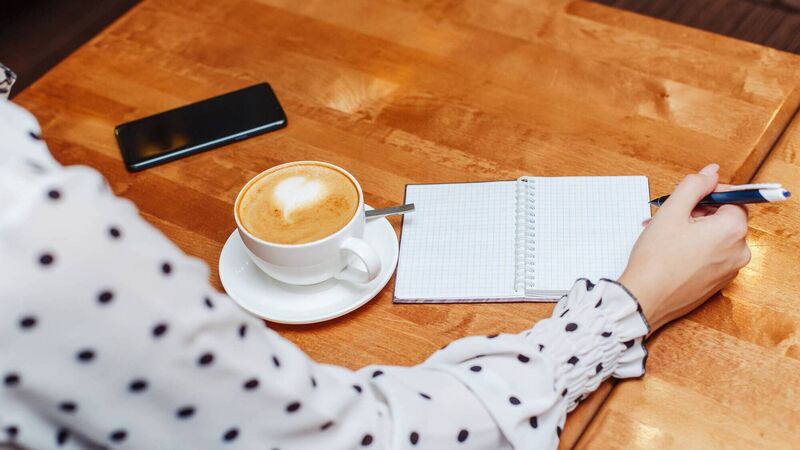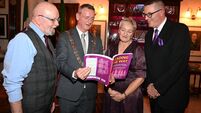What's the hype with journaling and how do I begin?

Business woman in cafe sitting and writing in notebook
Have you ever felt like your head is in a jumble, thoughts coming at you from all angles, with what seems to be dozens of tabs open?
It’s often accompanied by a feeling of lack of control, of life getting on top of you, of no time or space to process. Instead, you continue moving onto the next thing on the list, the next event to plan, or the next life curveball to overcome.
The overwhelm and unfinished business gets shoved into that metaphorical drawer in your mind, similar to the one in real life where random chargers and pens, leaflets and half-read post live. Not dealt with, but going nowhere, and becoming a literal and figurative burden over time.
Journaling is a proven and effective method of disentangling some of that mental mess, to separate the wires, and deliberately work through the noise to reach better clarity, ease, and wellbeing. You can pose questions to yourself you wouldn’t otherwise have time to reflect upon, you can begin to see patterns in your behaviour and emotional triggers, and you can work towards goals using journaling as a check-in and self-accountability approach.
Just like other forms of self-care, exercise and nutritional approaches, however, there is no one-size-fits-all with journaling. It can be trial and error to find which format works best for you.
Different ‘rules’ can be applied to journaling – an ad hoc approach where you journal when you feel the need, without pressure, or a more committed daily schedule. The famous book The Artist’s Way by Julia Cameron outlines a popular approach to journaling where you write morning pages, first thing every day. Having a set amount of three full pages to write forces you to fully immerse yourself in the process, and can often serve to get you past the mental block that can be experienced a few paragraphs in. It’s here the real transformations can occur, and magic can happen in terms of your insights and realisations.
There are also many mediums available to us for journaling, and the choice available to us is ever-expanding.
A good old-fashioned notebook is a tried and tested method to journal, and one that many come back to again and again. Picking up a pen and writing what’s on your mind is a very intentional way of getting your thoughts out. Physically writing them helps your mental processing.
For others, the accessibility of a phone is very appealing, and journaling can be possible in as simple a way as using the Notes app, or via a more purpose-built option such as a journaling app. In more recent times, Chat GPT is being used as a journaling prompt generator, although caution is needed to ensure it doesn’t replace qualified mental health support where needed.
For those who like to talk things through verbally, there’s even the option to do voice note journaling. Recording these to yourself on your phone can work well. This can feel very like offloading to a friend, minus the need to edit or censor in any way, and not looking for answers from others that you most likely already have inside yourself once you trust yourself to reach them.
Despite the many ways you can tailor journaling to your needs and preferences, there are a few core principles that remain universally helpful.
It’s best to journal in a place and way that feels safe. Inaccessible to any prying eyes, at a time and in a place that is private, where you can be honest, open and vulnerable, just for yourself. This removes any fear of judgment or analysis from others, leading to dilution of those tough emotions. You can achieve this by having a safe place to keep a notebook, by applying a password or face ID to a phone journaling app, or by not keeping your journaling, but instead deleting your entries as you go.
You should also, as best you can, journal without a filter. Take away the need to sound structured, right, or considered. The sentences don’t need to be whole or punctuated, and the language doesn’t need to be polished or even fully coherent. And what a relief that can feel like! This permission to be imperfect in your writing can also carry over into daily life. The weight being lifted of just being able to write, without having all the answers, makes it all the more likely for you to reach them in your own unstructured, exploratory way. This unfiltered process is rich and can be incredibly rewarding if you allow yourself to lean into it.
And finally, if you do keep your journal entries, it can be incredibly insightful to look back on them over time. Patterns can emerge, and common pitfalls in life and relationships can become apparent. You may experience recognition of strengths and weaknesses, acknowledgement of progress made, and a better understanding of the human condition that we’re all just muddling through.
Journaling can be your sounding board, your safe space, and your reminder that we’re in motion, not stuck. That overflowing mental ‘junk drawer’ starts to feel surprisingly less overwhelming when you take the time to work through it, piece by piece.







 App?
App?


